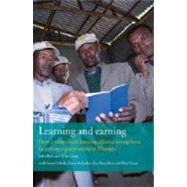- ISBN: 9789460221798 | 9460221793
- Cover: Paperback
- Copyright: 1/31/2012
As smallholder farmers switch to producing for the commercial market, they face a steep learning curve. To select a product and to market it effectively, they must understand both their immediate market situation and how the whole value chain works. Individual smallholders probably cannot grow enough on their own, so they have to get organized and sell their produce as a group. That takes leadership, organization, mutual trust and a common vision. They need to access a range of business services: inputs, financial services, training, market information, transport, government support, and so on. And they need to plan their businesses: analyze their potential markets, identify customers, negotiate with buyers and suppliers, work out their costs and expected income, look at their longer term position in the value chain, develop a business plan, and put the plan into operation. How best to help groups of smallholders to gain these skills? This book describes a learning alliance approach that combines training, practical assignments to develop an enterprise, on-the-job coaching, and the sharing of experiences among several groups of farmers. The approach was piloted in Ethiopia from 2007 to 2010 with 18 groups of farmers in Amhara, Oromia, the Southern Nations, Nationalities and Peoples (SNNPR) regional states. It covered a wide range of commodities, from staple grains to dairy, coffee, legumes, honey and incense. Where normal training courses impart skills that farmers find hard to apply to their own situation and soon forget, the learning alliance enables them to apply new skills to their own situations, reinforces their new knowledge, and gives them hands-on, guided experience with building their own businesses. That makes a learning alliance a highly effective way of enabling farmers to build their businesses in a sustainable way.







